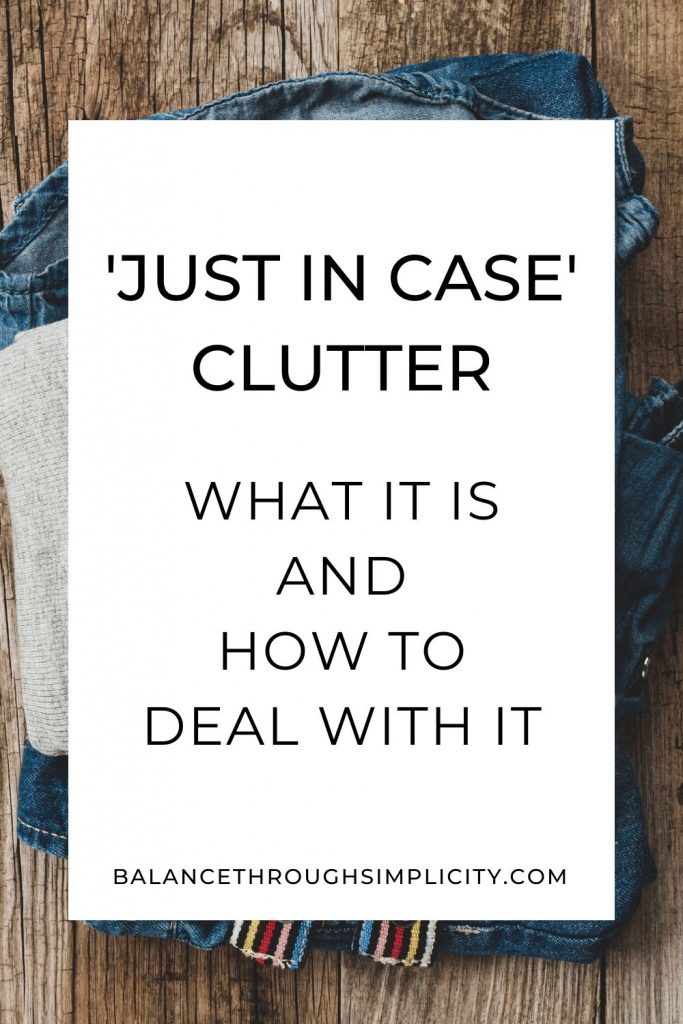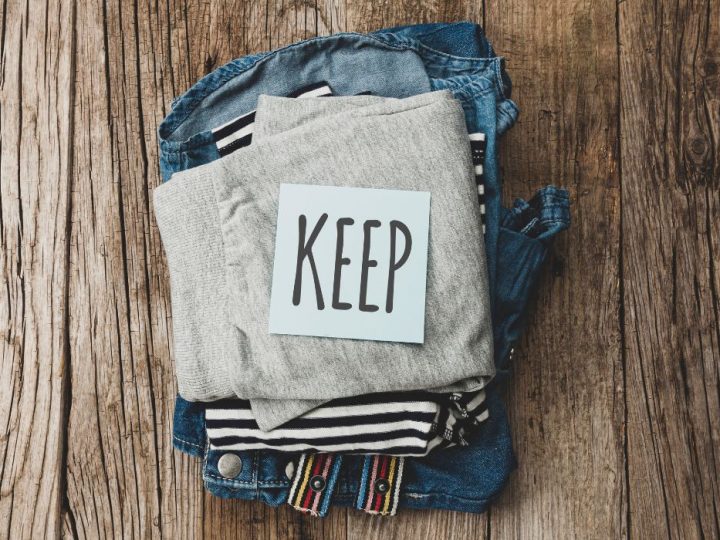‘JUST IN CASE’ CLUTTER: WHAT IT IS AND HOW TO DEAL WITH IT
How many times do you start decluttering, only to get stuck with deciding whether to keep an item or not, ‘just in case’? In this article I’m sharing some thoughts on what ‘just in case’ clutter is and how to deal with it.
‘JUST IN CASE’ CLUTTER
When I was decluttering my clothes, I came across several items that I knew I wouldn’t wear. They were itchy and felt uncomfortable, or just felt unflattering and I didn’t like how I looked in them. These were easy items to declutter because I could make a quick and relatively simple decluttering decision. I didn’t use them so I decluttered them.
However, there were a few other pieces in my wardrobe that I did get stuck on. I had a couple of dresses but hadn’t worn them for years. I wanted to keep hold of them ‘just in case’ I was going out somewhere that required a dress! I had the same ‘just in case’ thoughts when it came to some lovely (albeit uncomfortable) heeled shoes.
My husband’s stock response when I encourage him to declutter is that he’ll keep that (item of clothing, DIY tool etc) ‘just in case’. Chances are that he hasn’t worn it or used it for ages, but he’ll keep it anyway ‘just in case’.
WHAT IS ‘JUST IN CASE’ CLUTTER?
So, you’ve probably got the idea that ‘just in case’ clutter is the stuff that we keep ‘just in case’ we need it. We might not use it very often (or use it at all since acquiring it!) but we keep for those situations where we might still need it – just in case!
Maybe we’re worried that we’ll have to buy it again, or we’ll have to do without it, or it will make life difficult, or we’ll be sad or feel guilty, or that we can’t make a clear decluttering decision.
Decluttering decisions that are well thought-out and based on fact (our head making the decision rather than our heart) can usually avoid the build-up of ‘just in case’ clutter.
If you struggle with making these decisions, here are some other tips on how to deal with ‘just in case’ clutter.

HOW TO DEAL WITH ‘JUST IN CASE’ CLUTTER
Let’s look at some ways to deal with ‘just in case’ clutter and help you declutter your home with more ease and less stress!
1. Stop procrastinating
Sometimes we procrastinate because we can’t, won’t or don’t want to make a decision. If you struggle with decluttering procrastination, it might help to remember ‘why’ you’re decluttering. What is your end goal? What benefit do you hope you to gain from having less stuff in your home and life?
2. Use decluttering questions
I wrote an article about questions to help you decide what to keep and what to get rid of. If you approach decluttering armed with these decluttering questions it helps make the decluttering process more objective and less subjective. You can answer yes and no to many of them, instead of the ‘maybe’ which leads to ‘just in case’ clutter.
3. Be decisive
Sometimes we make a ‘just in case’ pile because it’s easier to not make a decision rather than risk making the wrong decision. I’m afraid the truth of it is that to be successful in decluttering, you’ll have to take plenty of decisions and own them. With practice and confidence, you’ll get most of those decisions right and be pleased with having less clutter in your home and life.
“Clutter is nothing more than postponed decisions.”
Barbara Hemphill
4. Be ok with making a wrong decision
The flip side of making decisions is that very occasionally you might get it wrong. I regret, at most, one or two things that I’ve decluttered over the years. Generally though, the benefit of having less stuff far, far outweighs the inconvenience of having decluttered something I later regretted.
5. Use a ‘just in case’ box
It’s ok to have a little bit of ‘just in case’ clutter. Keep it in a box or in a separate drawer or room. If you’re really not sure whether to keep something or let it go and want to err on the side of caution instead, put it in the ‘just in case’ box. You’re not getting rid of it right away so set a timeframe by which you need to have used the item. If you haven’t used it by that deadline, then let it go.
6. Worst-case scenario
Imagine you did get rid of something that you later found you needed, what’s the worst case scenario? Is it that you’d have to buy it again, or could you borrow or rent it?
7. High value or difficult to replace items
It’s one thing getting rid of a potato peeler but what about expensive or unique items that you want to keep ‘just in case’. Admittedly this is much more difficult than knowing what to do with something relatively small and cheap so be extra careful before you declutter these items. Maybe declutter some other items or rooms in your home and build up confidence and practice. Decluttering takes courage of your convictions so if you’re not convinced, leave it for now and re-visit it when you’re ready.
8. Go at your own pace
Which brings me on to the next point. When we’re wanting to make changes and improve our life, sometimes we’re enthusiastic, eager and ready to get it all done, yesterday! Decluttering isn’t actually always a fast job. Of course you can declutter quickly if you put your mind to it, but clearing clutter can also take a while. Clutter builds up over time and it takes time to get rid of it. And, of course, to keep it away for the long-term with some habits to stay clutter-free. If you feel you need more time to make a decision, go slow.
9. Fear
Decluttering fear is a real thing. Our belongings can often feel more than just mere physical stuff, they can represent memories of people, places, events and experiences. However, the vast majority of our stuff and particularly, that ‘just in case’ stuff, is usually not sentimental clutter but practical clutter. Something to wear for a particular occasion, a reference book we might need to glean information from, a tool that might repair something.
Examine the cause of your fear about getting rid of something. Is that fear rational? Would decluttering that item really mean you can’t attend that occasion, obtain the information you need from another source, or repair whatever needs mending in some other way? Fear holds us back from so many things, but it shouldn’t hold you back from improving your life.
10. Assess your priority
If I asked you ‘why do you want to declutter?’, I bet many of us would say to make space, create time and freedom, less stress, less tidying, cleaning and managing our homes. So, this ‘just in case’ clutter that you’re keeping could actually be stopping you from receiving all these decluttering benefits. It’s a question of what’s most important – your stuff or your time, energy and freedom.
‘JUST IN CASE’ CLUTTER
I hope this article has given you some insight into what ‘just in case’ clutter is and how to deal with it.
Decluttering our homes is no mean feat and it takes motivation, practice and confidence to clear our stuff. But, the end result is so worth it if you tackle your clutter, step-by-step, consistently and slowly.

RESOURCES TO HELP YOU DECLUTTER YOUR HOME
Here are some articles and resources to help you declutter your home and, hopefully, avoid accumulating too much ‘just in case’ clutter along the way!
- 11 simple things to do before you start decluttering
- Decluttering questions to help you declutter more effectively
- How to declutter when you feel overwhelmed
- Progress over perfection in decluttering – why decluttering doesn’t have to be perfect
- How to declutter when you don’t have time
- How to declutter your home and life
- 20 ways to declutter your home
SHARE YOUR THOUGHTS
I’d love to know whether you have ‘just in case’ clutter. If so, how do you deal with it? Let us know in the comments, I’d love to hear from you!
GET YOUR FREE WORKBOOK
If you’d like to start decluttering your home, why not get your copy of my free Declutter Starter Kit. It’s a free workbook packed with tips and advice to help you start decluttering your home, schedule, heart and mind.
Pop your details in the box below to get your copy!


Laura
Sunday 14th of May 2023
Hi Antonia, My two bits: another category of clutter, which I think is similar to "just in case" clutter, is "my ideal self" clutter. For instance, my ideal self is a great home cook and baker, so surely I need that springform pan that I haven't used once in the five years since I bought it because I was going to make a cake that needed a springform pan...only by the time I bought the pan because it was on my shopping list, I had forgotten what recipe it was. I haven't baked ANY cake since buying that pan, for that matter.
The reality is, when I come home from work, I'm tired, and I'm all about making the laziest possible meal that's still healthy, since I'm the only one eating it. I haven't baked in roughly a decade. Sometimes for me, getting rid of clutter requires the difficult acknowledgement that I'm never going to be that person, because although I'd like to be a great home cook and baker, I'm not willing to expend the time and energy to get there. Accordingly, those "ideal self" tools are clutter. It helps to remind myself that once I donate those items, I will be decluttering myself of the expectation that I'm going to become someone who uses them, and the guilt because I haven't done so yet.
Balance Through Simplicity
Wednesday 17th of May 2023
Hi Laura, I totally agree. Coming to terms with our expectations and realities is important, including how we think about our 'ideal self' or fantasy self. Goes back to the fact that many of the problems we have with decluttering are not about our stuff as such, but how we think and feel about that stuff. Thank you for sharing your thoughts.